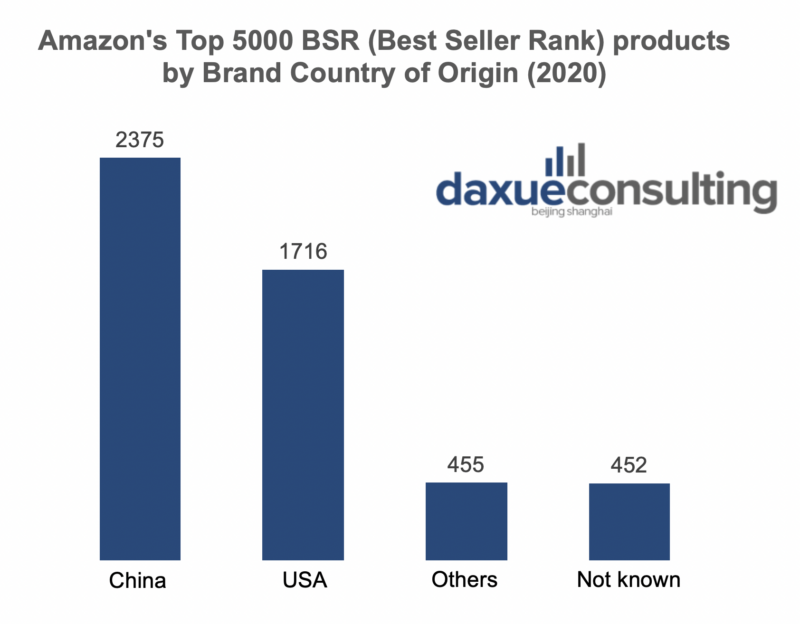In early 2021, the widespread suspension of Chinese sellers by the world’s leading e-commerce platform Amazon came as a shock to many. E-commerce giant Amazon decided to freeze thousands of Chinese stores. Amazon justifies its decision by referring to its terms of service, which were knowingly violated by Chinese sellers. The massive suspension has certainly been a real wake-up call for sellers worldwide to precisely comply with Amazon’s terms of service.

Chinese sellers on Amazon: Dimensions & figures
The number of Chinese stores selling through Amazon has been increasing constantly over the last decade. According to Marketplace Pulse, China-based sellers represented 75% of new sellers on Amazon in January 2021.
In 2021, Chinese sellers account for a substantial percentage of overall vendors on the platform. In fact, 38% of the top-selling brands on Amazon are based in China. It is estimated that around 200,000 Chinese sellers currently sell their products through Amazon. Among the top 5,000 products sold on Amazon, 2.375 originate from China. Many Chinese manufacturers have been putting forward the dream of selling on Amazon to reach a higher number of customers than relying solely on China’s biggest e-commerce platforms, such as Taobao, Jd.com, Tmall, and Alibaba, amongst others. Although, Wish has gained momentum in 2021.

Why did Amazon ban 50,000 Chinese sellers
Amazon claimed a severe violation of Amazon’s terms of service that has led to the decision to freeze accounts of over 50,000 Chinese sellers. The 50,000 affected accounts are estimated to have caused a 100 billion yuan loss for the industry according to the Shenzhen Cross-Border E-Commerce Association. In essence, improper use of review functions is considered to be the overarching cause of Amazon’s crackdown on Chinese sellers. In other words, instead of earning great reviews through high-quality products, some companies have chosen the path of review manipulation. There is no doubt that Amazon reviews are a powerful tool as they help customers determine product quality and authenticity.
Besides review fraud (i.e. paying for positive product reviews) as the most central argument in the debate of Amazon’s crackdown on Chinese sellers, the e-commerce giant claimed having observed other illegal practices, such as manipulating reviews by handing out gift cards which violates Amazon’s terms of service. For a long time, enforcing its policies has not been a top priority for Amazon. In 2021, however, the fact that Amazon sellers willingly violated Amazon’s terms of service has triggered Amazon’s massive crackdown on Chinese sellers.
There are good reasons for Amazon’s decision to put an end to the malpractices of its sellers. As was investigated by Smarter Searches, an undistorted and fair review system is essential, as it encourages better consumer choices, increased creativity, as well as good feedback for the e-commerce platform owner.
Guangdong: a province severely hit by Amazon’s crackdown on Chinese sellers
Guangdong province is truly a hub for Amazon sellers in China. Among China’s cross-border e-commerce, sellers from the Guangdong province account for 70%, of which 50% are from Shenzhen. For example, Shenzhen-based electronics company Sunvalley with its companies RAVPower power banks, Taotronics earphones, and VAVA cameras were subject to the harsh ban. Similarly, power bank-producer Aukey, as well as Mpow, were all affected by the crackdown and suddenly disappeared from the Amazon platform.

Looking forward: Strategies applied by Chinese manufacturers to sell their products
Although a rebound of Chinese sellers can already be observed, it remains questionable to what extent Chinese manufacturing giants will return to using Amazon as their main distribution channel. Rather, it seems likely that Chinese manufacturers switch (back) to Chinese e-commerce platforms. This is currently also encouraged by the Chinese government as Chinese sellers currently count on governmental support to establish new possibilities to sell their products. Currently, Shenzhen is offering cross-border e-commerce merchants a subsidy of 2 million yuan, which should encourage them to identify alternative channels to compensate for the damage caused by Amazon. The initiative also aims at boosting manufacturers to set up their own online stores independent of Amazon.
Takeaways of Amazon’s crackdown on Chinese sellers
- The crackdown was a wake-up call for all Chinese companies on Amazon, warning them to assess their compliance
- More than 50,000 marketplace seller accounts have been affected by Amazon’s crackdown on Chinese sellers.
- Chinese e-commerce platforms profit from Amazon’s crackdown on Chinese sellers.
- The Chinese government is currently bailing out suspended Chinese sellers by incentivizing them to look for different distribution channels and providing financial support.





